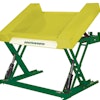Idiopathic inflammatory bowel disease (IBD) and gastrointestinal lymphoma are common disorders in cats. The aim of this study was to evaluate fecal α1-protease inhibitor (PI) concentrations, a marker of gastrointestinal protein loss, in cats with histopathological evidence of gastrointestinal inflammation or gastrointestinal neoplasia.
Fecal and serum samples were obtained from 20 cats with chronic gastrointestinal disease in which endoscopic biopsies were performed. The cats were divided into two groups based on histopathology: Group A (n = 8) had mild to moderate IBD; Group B (n = 12) had severe IBD or gastrointestinal neoplasia.
Nineteen of the 20 diseased cats had elevated fecal α1-PI concentrations, ranging from 1.9 to 233.6 μg/g compared to 20 healthy control cats (normal range: less than 1.6 μg/g ). Fecal α1-PI concentrations were statistically, significantly different between healthy cats and cats of Group A (median: 3.9 μg/g, range: 1.3-9.2 μg/g) or cats of Group B (median: 20.6 μg/g, 4.3-233.6 μg/g), and between cats of Groups A and B. Hypoalbuminemia, hypoproteinemia and hypocobalaminemia were detected in 88%, 83% and 56% of the diseased cats, respectively.
This study suggests that increased fecal α1-PI concentrations in association with low serum albumin and total protein concentrations may be a common finding in cats with IBD or gastrointestinal neoplasia. Further, fecal α1-PI concentrations appear to be higher in cats with severe IBD or confirmed gastrointestinal neoplasia compared to cats with mild to moderate IBD.
Source : K.F. Burkea et al., 2012. Evaluation of fecal α1-proteinase inhibitor concentrations in cats with idiopathic inflammatory bowel disease and cats with gastrointestinal neoplasia. Vet J online December 2012. doi: 10.1016/j.tvjl.2012.09.019


















